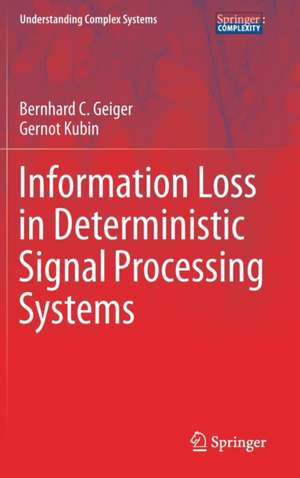Information Loss in Deterministic Signal Processing Systems: Understanding Complex Systems
Autor Bernhard C. Geiger, Gernot Kubinen Limba Engleză Hardback – 10 iul 2017
This book introduces readers to essential tools for the measurement and analysis of information loss in signal processing systems. Employing a new information-theoretic systems theory, the book analyzes various systems in the signal processing engineer’s toolbox: polynomials, quantizers, rectifiers, linear filters with and without quantization effects, principal components analysis, multirate systems, etc. The user benefit of signal processing is further highlighted with the concept of relevant information loss. Signal or data processing operates on the physical representation of information so that users can easily access and extract that information. However, a fundamental theorem in information theory—data processing inequality—states that deterministic processing always involves information loss.
These measures form the basis of a new information-theoretic systems theory, which complements the currently prevailing approaches based on second-order
statistics, such as the mean-squared error or error energy. This theory not only provides a deeper understanding but also extends the design space for the applied engineer with a wide range of methods rooted in information theory, adding to existing methods based on energy or quadratic representations.| Toate formatele și edițiile | Preț | Express |
|---|---|---|
| Paperback (1) | 633.68 lei 43-57 zile | |
| Springer International Publishing – 4 aug 2018 | 633.68 lei 43-57 zile | |
| Hardback (1) | 639.90 lei 43-57 zile | |
| Springer International Publishing – 10 iul 2017 | 639.90 lei 43-57 zile |
Din seria Understanding Complex Systems
- 18%
 Preț: 1112.30 lei
Preț: 1112.30 lei -
 Preț: 439.25 lei
Preț: 439.25 lei - 18%
 Preț: 1119.38 lei
Preț: 1119.38 lei - 15%
 Preț: 401.82 lei
Preț: 401.82 lei - 18%
 Preț: 1247.26 lei
Preț: 1247.26 lei - 15%
 Preț: 641.20 lei
Preț: 641.20 lei - 15%
 Preț: 642.68 lei
Preț: 642.68 lei - 15%
 Preț: 651.51 lei
Preț: 651.51 lei - 18%
 Preț: 946.55 lei
Preț: 946.55 lei - 18%
 Preț: 947.98 lei
Preț: 947.98 lei - 20%
 Preț: 650.27 lei
Preț: 650.27 lei - 18%
 Preț: 952.09 lei
Preț: 952.09 lei - 18%
 Preț: 957.13 lei
Preț: 957.13 lei - 18%
 Preț: 943.88 lei
Preț: 943.88 lei -
 Preț: 398.35 lei
Preț: 398.35 lei - 5%
 Preț: 1417.54 lei
Preț: 1417.54 lei - 15%
 Preț: 648.42 lei
Preț: 648.42 lei -
 Preț: 387.75 lei
Preț: 387.75 lei - 18%
 Preț: 1133.76 lei
Preț: 1133.76 lei - 18%
 Preț: 948.16 lei
Preț: 948.16 lei - 20%
 Preț: 655.85 lei
Preț: 655.85 lei - 18%
 Preț: 1113.09 lei
Preț: 1113.09 lei - 20%
 Preț: 655.53 lei
Preț: 655.53 lei - 15%
 Preț: 653.00 lei
Preț: 653.00 lei - 18%
 Preț: 1392.77 lei
Preț: 1392.77 lei - 18%
 Preț: 1010.48 lei
Preț: 1010.48 lei - 18%
 Preț: 955.56 lei
Preț: 955.56 lei -
 Preț: 384.22 lei
Preț: 384.22 lei - 18%
 Preț: 950.66 lei
Preț: 950.66 lei - 15%
 Preț: 638.43 lei
Preț: 638.43 lei - 15%
 Preț: 644.49 lei
Preț: 644.49 lei - 15%
 Preț: 647.40 lei
Preț: 647.40 lei - 15%
 Preț: 649.06 lei
Preț: 649.06 lei - 15%
 Preț: 639.25 lei
Preț: 639.25 lei - 15%
 Preț: 643.65 lei
Preț: 643.65 lei - 18%
 Preț: 960.78 lei
Preț: 960.78 lei - 15%
 Preț: 649.87 lei
Preț: 649.87 lei - 15%
 Preț: 645.47 lei
Preț: 645.47 lei
Preț: 639.90 lei
Preț vechi: 752.83 lei
-15% Nou
Puncte Express: 960
Preț estimativ în valută:
122.45€ • 128.17$ • 101.91£
122.45€ • 128.17$ • 101.91£
Carte tipărită la comandă
Livrare economică 31 martie-14 aprilie
Preluare comenzi: 021 569.72.76
Specificații
ISBN-13: 9783319595320
ISBN-10: 3319595326
Pagini: 145
Ilustrații: XIII, 145 p. 16 illus., 9 illus. in color.
Dimensiuni: 155 x 235 mm
Greutate: 0.4 kg
Ediția:1st ed. 2018
Editura: Springer International Publishing
Colecția Springer
Seria Understanding Complex Systems
Locul publicării:Cham, Switzerland
ISBN-10: 3319595326
Pagini: 145
Ilustrații: XIII, 145 p. 16 illus., 9 illus. in color.
Dimensiuni: 155 x 235 mm
Greutate: 0.4 kg
Ediția:1st ed. 2018
Editura: Springer International Publishing
Colecția Springer
Seria Understanding Complex Systems
Locul publicării:Cham, Switzerland
Cuprins
Introduction.- Part I: Random Variables.- Piecewise Bijective Functions and Continuous Inputs.- General Input Distributions.- Dimensionality-Reducing Functions.- Relevant Information Loss.- II. Part II: Stationary Stochastic Processes.- Discrete-Valued Processes.- Piecewise Bijective Functions and Continuous Inputs.- Dimensionality-Reducing Functions.- Relevant Information Loss Rate.- Conclusion and Outlook.
Textul de pe ultima copertă
This book introduces readers to essential tools for the measurement and analysis of information loss in signal processing systems. Employing a new information-theoretic systems theory, the book analyzes various systems in the signal processing engineer’s toolbox: polynomials, quantizers, rectifiers, linear filters with and without quantization effects, principal components analysis, multirate systems, etc. The user benefit of signal processing is further highlighted with the concept of relevant information loss. Signal or data processing operates on the physical representation of information so that users can easily access and extract that information. However, a fundamental theorem in information theory—data processing inequality—states that deterministic processing always involves information loss.
These measures form the basis of a new information-theoretic systems theory, which complements the currently prevailing approaches based on second-order
statistics, such as the mean-squared error or error energy. This theory not only provides a deeper understanding but also extends the design space for the applied engineer with a wide range of methods rooted in information theory, adding to existing methods based on energy or quadratic representations.Caracteristici
Presents a definition of information loss for signal processing systems which is the basis of an information-theoretic systems theory Analyzes various systems in the signal processing engineer’s toolbox: polynomials, quantizers, rectifiers, linear filters with and without quantization effects, principal components analysis, multirate systems, etc. Highlights differences and similarities between design principles based on information-theoretic quantities and those based on energetic measures, such as the mean-squared error Includes supplementary material: sn.pub/extras
